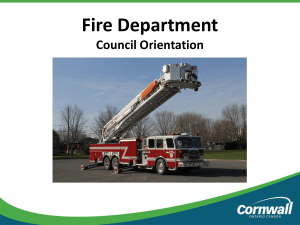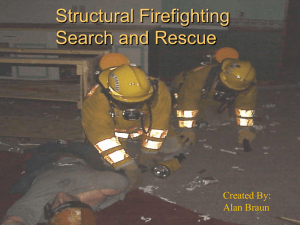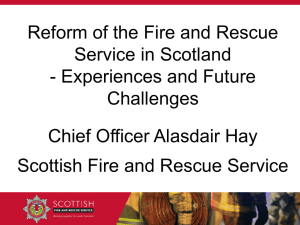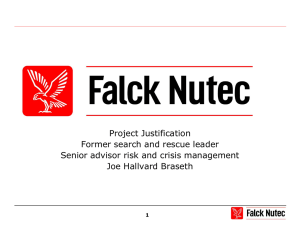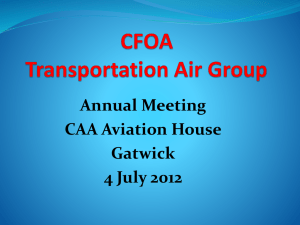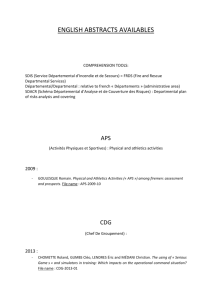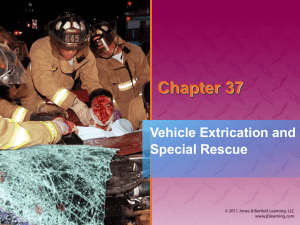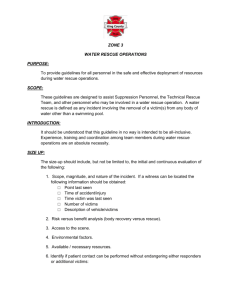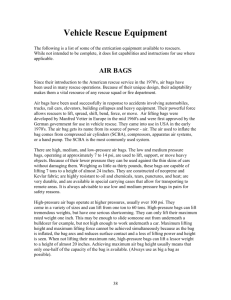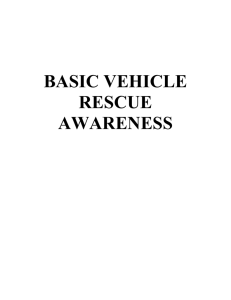Discussion Orange County Fire Rescue Organizational Assessment
advertisement
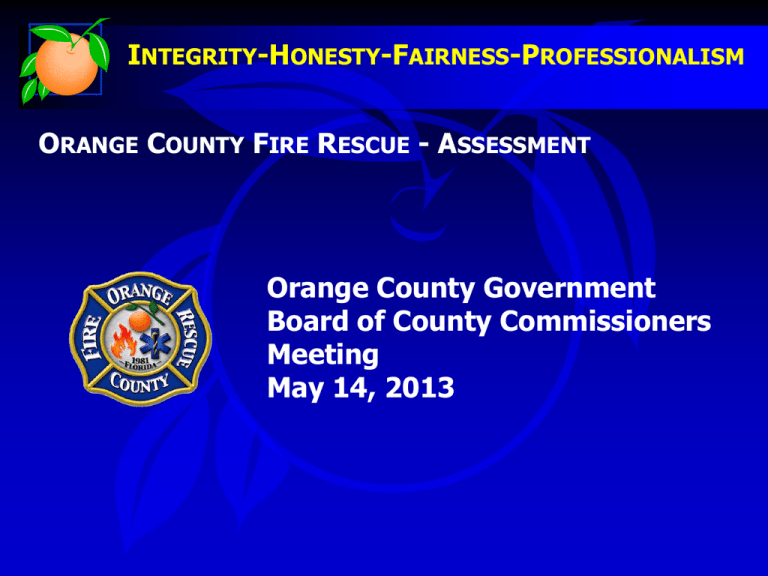
INTEGRITY-HONESTY-FAIRNESS-PROFESSIONALISM ORANGE COUNTY FIRE RESCUE - ASSESSMENT Orange County Government Board of County Commissioners Meeting May 14, 2013 PRESENTATION AGENDA • • Background Divisional Assessments - • • Issue Statements Action Statements Expected Outcome Departmental Initiatives Questions QUICK FACTS - 41 Fire Stations Responded to over 93,000 calls in FY12 Over 54,000 EMS Transports 1158 Employees 4th Largest Fire Department in Florida • • • Miami – Dade (1) Jacksonville (2) Palm Beach County (3) BENCHMARK DEPARTMENTS Department # of Stations Uniform Personnel Service Area Population Served Total Budget Rounded to Nearest Mil. Cost Per Capita City of Orlando 17 499 110 237,000 90,000,000 $380.00 City of Jacksonville 62 1200 840 900,000 174,000,000 $193.00 Palm Beach County 49 1490 1822 864,528 348,000,000 $403.00 Miami-Dade County 69 2100 1883 1,802,056 369,873,000 $205.00 Orange County 41 1000 780 800,491 155,233,332 $194.00 ADMINISTRATION • Fiscal Management ‒ ‒ ‒ ‒ ‒ Financial Analysis Accounts Receivable Accounts Payable Procurement Revenue • • Employee Services ‒ ‒ ‒ Professional Standards Career Planning Recruitment/Testing Safety ‒ ‒ ‒ ‒ Emergency Scene Safety Health and Wellness Life Safety (Community Risk Reduction) Public Information Office ADMINISTRATION Fiscal Management Issue – The declining revenues that support Fire Rescue Services, if not addressed, will result in: • Reduced standard of care • Increased response times • Increased property damage, injury, and death Action – Seek out operational efficiencies while focusing on areas that will enhance service delivery, diversification of revenues, enhancement of existing revenue Expected Outcome – An effective and efficient service delivery model, a diverse stable revenue stream that will better withstand economic fluctuations, a better alignment between fees and cost of service ADMINISTRATION Employee Services Issue – A continued organizational focus on diversity must be maintained, in order to: • Build upon past success • Maintain benefits gained from inclusion of various segments of our community • Continuously overcome challenges in recruiting qualified under represented members of the community • Assure organizational understanding of our diverse evolving community Action – Seek out results oriented recruitment and promotional processes that will assure equal access and opportunity Expected Outcome – A well qualified highly professional workforce reflective of and responsive to the community we serve ADMINISTRATION Population : Certified Personnel 13% 1% 1% 19% 66% White Hispanic Black Asian Other Nationally – Women in the fire service equal 2% of the total population. OCFR – Women equal 10% of the work force OPERATIONS • Emergency Response ‒ ‒ ‒ ‒ ‒ Structure Fire Wild land Fire Motor Vehicle Accident Advanced Life Support Basic Life Support • • Emergency Medical ‒ ‒ ‒ ‒ Medical Support Quality Assurance/Quality Improvement Reporting/Billing Hospital Liaison Special Operations ‒ ‒ ‒ ‒ ‒ Hazardous Materials High Angle Rescue Confined Space Rescue Urban Search and Rescue Dive Rescue OPERATIONS Deployment of Resources Issue - The current emergency deployment model, if not addressed, will result in: • A misalignment of resources versus needs • Delayed response • Increased damage to properties and/or wasted resources Action - Conduct a critical task analysis in order to match the appropriate resources to hazard and/or risk by property type. Expected Outcome - OCFR will establish deployment models based on critical fire ground tasking by property risk types i.e. moderate residential, high-rise, commercial and industrial occupancies. High Probability Low Consequence High Probability High Consequence Moderate Risk Maximum Risk Distribution Low Isolated Risk Low Probability Low Consequence Concentration PROBABILITY OPERATIONS High Special Risk Low Probability High Consequence CONSEQUENCES COMMUNICATIONS • Dispatch Center - Call-taking Emergency Medical Dispatch Pre-arrival instructions Emergency dispatch/ scene support - - Telecommunications EMD Quality Assurance/Quality Improvement Computer Aided Dispatch Research & Planning COMMUNICATIONS Communications Issue: The processing of emergency calls for service is a critical link in the mitigation of emergencies, if not regularly measured may result in: • Delayed response • Decreased survivability • Increased property damage Action: Assessment of current call processing procedure and development of a pre-alert dispatching system. Expected Outcome: Improvement in overall response time and increased capacity with the use of existing resources. COMMUNICATIONS COMMUNICATIONS • Response Time Reduction Initiative Includes All Incident Calls 11/30/12 • Alarm Handling 1:29 • • Total Response Time 03/25/13 0:29 10:41 Total Response Reduction Time is :53 “Seconds Save Lives” 09:48 COMMUNICATIONS OFFICE OF THE FIRE MARSHAL • Plans\Code Compliance • • • • • Building Plans Review New Development Review Code Development Review Fire Protection Plan Review Fire Inspections • • • • Fire Safety Inspections Operational Permit Inspections Code Compliance Inspections Childcare facility Inspections OFFICE OF THE FIRE MARSHAL Issue: Plans processing, inspection, and issuance of permits must be handled in a timely, accurate manner, and if not addressed will result in: • • • Lack of confidence within the building community Missed economic development opportunities Increased taxpayer burden in order to maintain existing level of service Action: Assessment of current practices and procedures. Expected Outcome: Improved overall plan processing, permit issuance to final approval time and increased customer satisfaction\confidence TRAINING Recruit Training • ‒ ‒ ‒ ‒ ‒ • • Basic Fire Response Vehicle Extrication Incident Command Standard Operating Procedures Probationary Assessments ‒ ‒ ‒ ‒ ‒ ‒ ‒ Specialty Training ‒ ‒ ‒ ‒ ‒ ‒ ‒ Trench Rescue Building Collapse Rope Rescue Confined Space Vehicle Machinery Rescue Hazardous Materials Dive Rescue Incumbent Training • Continuing Education Re-certification New equipment Policy and Procedures Command School Lieutenants Academy Battalion Chiefs Academy Medical Training ‒ ‒ ‒ ‒ ‒ Advanced Cardiac Life Support Pediatric ALS Protocol & Procedures New Equipment Continuing Education TRAINING Issue: The lack of a comprehensive professional development program couple with increased industry and community expectations, if not addressed will result in: • • • Increased liability to the Department/County A mismatch between existing skill sets and expectations A gap between needs and available future leaders Action: Development of a comprehensive training and development program. Expected Outcome: A professional development system that fulfills expectations across all ranks, enhances customer service levels, and provides a ready cadre of future leaders. TRAINING Professional Development Life Cycle 1. Technical Position Competency 2. Formal Training 3. Leadership Training/ Performance Counseling by Supervisor (OJT) 4. Promotion Prep Fire Fighter Fire Fighter II EMT- B, P Incident Command Engineer Driver/Pump Ops Paramedic College Credits Lieutenant Fire Officer I Fire Service Inst. Associates Captain/Battalion Chief Fire Officer II, III Bachelors Degree NFA Executive Officer Assist, Division, Deputy Chief Masters Degree Executive Fire Officer TRAINING Issue: The lack of a modern sustainable fire service training center within Orange County, if not addressed will result in: • • • Increased cost to deliver mandated training Decreased ability to meet the demand and community expectation Possible increased liability Action: Conduct a regional needs assessment and formulate training center strategic development plan Expected Outcome: A training center strategic development plan that identifies potential partners, users, and identifies needed infrastructure to meet current and future needs of the OCFRD. LOGISTICS • Vehicle Support ‒ ‒ ‒ ‒ ‒ • Preventative Maintenance Fire Apparatus Repair Aerial Apparatus Repair Vehicle Testing Apparatus Specification • Facilities ‒ ‒ ‒ ‒ ‒ Project Management Fire Station Design Facility Upgrades Facility Repairs Facility Location Planning Supply/Equipment ‒ ‒ ‒ ‒ ‒ ‒ Personnel Protective Equipment PPE Testing & Repair Station Supplies Medical Supplies Uniforms Emergency Apparatus Supplies LOGISTICS Issue: Aging departmental infrastructure, increased demand for service, and community development, if not addressed will result in: • • • • Increased Increased Increased Increased vehicle repair time vehicle maintenance cost station repair and maintenance costs response time, property damage, death, and disability Action: Conduct a infrastructure needs assessment. Expected Outcome: An infrastructure replacement plan that considers non-traditional options that will allow the department to provide for service demands in the most fiscally responsible manner. DEPARTMENTAL INITIATIVES • • • • • • • • • • • • Station/Facility visits Critical Incident Notifications Orange County Community Bridge Insurance Services Office – Resurvey Program Departmental Leadership Program – Point of the Spear Career Development Manual Benchmarking Study Dive Training Program Lessons Learned Database Oath of Office for Officers Departmental Reorganization Managing for Results Questions Orange County Community Bridge Program • Partnership between United Way and OCFR • Designed to bridge the gap between citizens and available community resources • Fire Rescue personnel can be the bridge that makes a difference in the life of a person or family in need Point of the Spear “Somehow the subjects touched on all aspects of our jobs. From the situations we deal with to how to handle them, it was on target 100%! I have learned and grown so much in 1 week.” Point of the Spear “This course taught me how to use leadership tools to be more effective as a leader and as a subordinate.” Point of the Spear “I have been in the fire service for 30 years. This will enhance my ability to grow better people and better leaders.” Point of the Spear “One thing our organization lacks when it promotes people, is teaching those new leaders the skills to be successful. This class is a great learning tool to prepare new leaders and build teamwork.”
